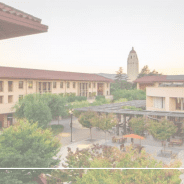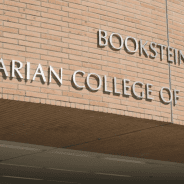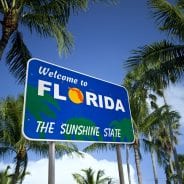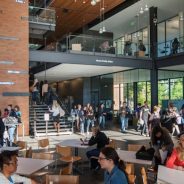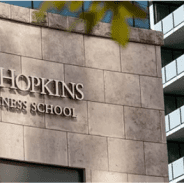Search results for career:
Stanford GSB Executive Education Pivots Programming Amid COVID-19
MetroMBA recently interviewed Sarah Soule, Senior Associate Dean for Academic Affairs, and Ryann Price, Director at the Stanford Executive Program, of Stanford GSB to discuss the school’s pivot in program offerings as COVID-19 impacts higher education. Sarah and Ryann also talk about the future of Stanford GSB Executive Education post-pandemic and provide in-depth information on specific programs they are offering for 2020-2021.

Can you provide a brief overview of the new Stanford GSB Executive programs? Talk a little about why Stanford GSB decided to pivot their program offerings and the process you took to design the courses.
Sarah: The Stanford GSB Executive program just launched their on-demand online classes in the beginning of September. These courses allow participants same-day access to experiential research-based content that was designed by the Stanford GSB faculty. The program was developed so that leaders can immerse themselves in topics that are relevant right now and are business challenges they face currently, so students can have real impact on their organizations. Additionally, the Stanford GSB on-demand online classes are available for you to self-pace yourself as you go through the program.
The process the Stanford GSB Executive program took to decide these topics was to focus on the challenges we are facing right now. The first topic, given the climate of the country and the world, is leveraging diversity and inclusion for organizational excellence because of course there has been so much attention on the reaction to the killing of George Floyd, and the protests in the U.S. and other places on what organizations can do to improve upon diversity and inclusion. Another topic is focused on disrupting your business, thinking about the climate we are in right now with the pandemic and what economic forces are doing to business right now. The main takeaway is how leaders respond to these challenges and their ability to be agile to that response.
The next learning topic is focused on sharpening communication skills. The Stanford GSB Executive Program discovered that leaders right now need better abilities to communicate both internally and externally. For example, Zoom has become a new mode of business for us all, so finding effective ways to communicate using this platform is vital. In addition, thinking about the importance of communicating to disperse workforces and how to effectively do that. Finally, the last course is our Paths to Power, a class that has been very popular in our MBA program for many years and the Stanford GSB Executive program thought it was great opportunity to roll out during our pivot.
There is no application fee for this program; however, each course is $1,500 and you receive a certification on completion. It is on-demand and online where you sign up and are immediately put into the class. You have 60 days to access the program, but you can do this at your own pace. The courses have assignments, which they have designed to be experiential and engaging with feedback from professors. The plan is to roll out more courses as the program continues.
Can you talk more about the newly launched Stanford Business Leadership Series and the adjustment to the Stanford Ignite program?
Sarah: The Stanford Business Leadership series was launched this summer and exceeded expectations in terms of the quality and quantity of the number of participants. The program gives students the ability to purchase a subscription, which provides access to over 50 faculty members. We are about to launch the second version in October 2020. Like the on-demand classes, the Stanford GSB Executive program decided to be really particular about the kind of needs leaders have right now.
There are a variety of modules available to students, who can choose to do all of them or just do one. The modules include Leading in the COVID Era, Leading Diversity and Inclusion, Leading Strategy on Development through Execution, and Lead Transformation: 5 Mega Trends Every Leader Needs to Know.
The Stanford Leadership Program is different than the online on-demand learning; these programs cost $2,500 for a 2-week module or a 10-week module for $7,500 all-access pass (though prices may adjust). The summer program had their first topic, “Leading in a Turbulent World,” thinking a lot about where we are as leaders during the pandemic and economic crisis. They also had a module on strategic leadership, another on innovation and creativity, another about entrepreneurial mindsets, and demystifying the numbers.
The summer Stanford Business Leadership series sought to implement what they are known for as a business program and Executive Education, but add a layer about what is going on in the world. Now in the fall, we want to focus on what is going on in the world and how Stanford can leverage how to speak best to COVID, diversity and inclusion and a distressed workforce. There is no prep work for the program since it is all lecture and Q&A, compared to the other program where there are assignments. Upon completion of the program, all students receive a certificate.
Another program we launched that has been incredibly successful, is that we pivoted a number of programs we planned in-face to online experiences. The Stanford Ignite entrepreneurial program, which is a multi-week program, we put it online for students who had planned to attend on-campus. Students were with us on Zoom throughout the day.
Ryann: Other learning opportunities at the Stanford GSB Executive Program that transitioned from in-face to online experiences include: Innovative Technology Program, Program for Growing Companies, Harnessing AI and Big Data. With these we experimented over a number of weeks, and students would attend a number of hours in the morning then work their jobs. We learned how long they should spread content out. For example, can students handle eight hours of learning on Zoom? We found that people need connection and people need learning. Leaders are making up so much as they go through their day to day, they need engagement, connection and learning.
Learn more about the Stanford Executive Education Offerings.
What was the process you went through to decide on the pivot?
Sarah: Ryann was involved with the pivot and deciding on how to provide these programs.
We did what we teach: Design thinking, customer empathy, really finding out what problems people have and how they are experiencing them, to understand through their point of view what their problems and needs are. We spent a lot of time talking to students in their program and who were disappointed they weren’t able to travel and offer face to face program. We spoke with custom clients to find out the challenges they face right now versus what they thought they would be facing. We used that information on how to respond to the here and now and meet people where they were at the moment with the current challenges. It was an all hands-on deck between administration and faculty to get this implemented and launched.
Ryann: One highlight about the process – we were listening and testing out what we heard from leaders about staying connected and they wanted a better sense of hope and greater control of what was happening in the world. We tested how that would be received through a ‘7 Day Challenge,’ a free series of content based off of creativity from faculty members. That series was very popular and people felt like they could engage with a sense of purpose. We felt they were given tools at this time of need.
We used data via partnership with our coaching provider through our executive program. We had access to larger data sets about what students are talking about with their coaches, not at an individual level, but at a theme level. So, they were able to see that struggling with uncertainty was a challenge and we also found people wanted help with communication. Also, we heard from users that flexibility was important to them. All of these programs offer a higher degree of flexibility. People who typically have a 9 to 5 job now have greater access to these programs and manage their work/life balance.
What is a typical participant profile for the Stanford GSB Executive Education programs?
Sarah: The anti-racism module that is about to be released is for anyone who is curious or wants to engage in material.
The Stanford Business Leadership program tends to target upper level leaders in companies and nonprofits with some degree of leadership or managerial experience.
We also plan to continue our LEAD program, which is a one-year certificate program. With this program, the spring intake had the largest cohort with just under 300 participants. There are over 520 students in our new fall intake. This provides something that people need. This participant set is typically (see attachment). Many already have advanced degrees, but they are people who are at a career pivot, new role in their organization, leadership training, and/or usually managing some people. Some already had an MBA, but wanted more leadership training or a brush up on the core classes they provide.
Our Stanford Ignite program ran one cohort for post-9/11 veterans, which was very specific, but we care deeply about this demographic as a school. We also hosted another program for aspiring entrepreneurs. What we have been doing with the pivot is serving more and different people than we normally would in face to face programs. We are offering more access with these online programs that offer more flexibility.
Ryann: These online programs are designed to remove the barrier for those who want to attend our on-campus programs – it usually is a geography barrier, but also they may be a founder of a company, but could not commit to a face to face experience. We hope to understand that user profile so we can continue to develop programs that are more flexible and accessible.
Do you view the Stanford GSB Executive Education programs as a complement or alternative to an MBA?
Sarah: The challenges that we have been discussing would most definitely benefit an MBA. The on-demand classes for 60 days can absolutely be taken with an MBA and are viewed as a complement. There might be students who want to see more diversity and inclusion in their curriculum. You might be in an MBA program that does not cover topics such as inclusion and diversity, but you would like to learn more. Taking the online on demand class is set up so you can take this as a complement and earn your certificate strengthening your professional profile.
The LEAD program is one year and based on the time commitment, so it wouldn’t be a complement to a current MBA; however, many students believed it would be a great option as a ‘third year’ to their MBA because they learn key skills and expand their network.
Ryann: Also, the Stanford Ignite program has multiple cohorts per year and the part-time program is designed for driving innovation or for entrepreneurship. The program is committed to exploring what it would be like as an entrepreneur or if they stay with their current role and want to transition to the team driving innovation via the product or process side.
What is the admissions process for the Stanford Executive Education Programs?
Ryann: There are programs that do not have an application. We encourage applicants to select the right application for you. Stanford also has learning advisors during all business hours to answer questions to help learners select the right program. The first step is if you are not sure, reach out to them.
If there is an application for a program, it sounds a little cliché, but we recommend leading with yourself. We want to bring together a live dynamic learning experience for their peers. We want to find people when we put the cohort of individuals together, we want to create a dynamic class. We are hoping through the admissions process to provide the right opportunity for them. We want to create an experience where faculty and students are learning together.
Sarah: LEAD is a long certificate program. We have an application process with an essay and two video questions. We look at them really seriously and take into consideration the whole application. We want to make sure you are a change agent and how you can contribute in the classroom.
Will the impact of COVD-19 make these learning opportunities the norm for future leaners?
Sarah: It is exciting because this is a new opportunity and we do not know when it will be safe again to be on-campus and travel. Since we had to make this pivot, it allows more flexibility. It will provide more blended experiences – such as bringing people to campus for two days for an intense experiential learning program. It will also complement their current offerings and potentially be an additional opportunity for students moving forward. It will allow us to change the way they think about what it is we offer in terms of educational opportunities for leaders.
Ryann: We are asking ourselves this question every day and using a discovery process – always iterating and learning and considering other options. Faculty are creating ideas and staff are articulating how they can logistically make them possible. It is a challenging time because it is not safe to be on campus, but it allows them to be free to explore what could be possible. We are proud that we came together to find innovative products and serve their students’ needs.
Thinking of an MBA? Prior Business Degrees Not Needed.
With job offers delayed or withdrawn in a pandemic economy, some professionals may find that getting a Virginia Tech MBA can be a productive way to sharpen skills and add credentials while waiting to launch the next stage of their careers while thinking of an MBA.
Those who majored in science, engineering, and other nonbusiness disciplines as undergraduates will discover that a prior business education isn’t needed to enroll or excel in an MBA program.
Far from being a barrier to success, technical backgrounds can be a basis for diversifying or rounding out knowledge and skills for managing or leading change in today’s data economy.
From the Students
Ryan Feber, a 2003 Virginia Tech graduate in computer science, for example, believes his computer science degree “is more important than a business undergrad degree when thinking about product management or positions at tech companies.”
Feber chose to pursue a Virginia Tech MBA for a number of reasons: “I was certainly familiar with the brand, loved my time in Blacksburg, and wanted to extend that to my graduate degree. The availability of the Commonwealth Campus student approach, the value of the program, and the proximity to my current workplace (and Metro access) also factored in.”
Bryan Gassenmeyer earned a degree in industrial and systems engineering at Virginia Tech in 2006 and has developed a successful career in sales engineering ever since.
Currently a senior sales engineer for a leading global manufacturer of heating, ventilation, and air-conditioning equipment for the residential, commercial, and transportation markets, Gassenmeyer decided he wanted to build his business knowledge base and get a master’s degree to strengthen his credentials and create a foundation for his next career steps.
“Many employers find an individual with an engineering background and an understanding of business to be very attractive as someone who can communicate in both areas,” Gassenmeyer said. “The VT MBA achieves this goal for me. It increases my value to my current employer for promotion opportunities and also increases my competitiveness for opportunities outside my current company.”
Virginia Tech’s MBA program was his “clear first choice,” he said. Its top ranking and reputation and convenient location in metro Washington, D.C. made it an enticing choice.

Return on Investment
Both students are pleased with the skills and knowledge they have gained so far. Feber cited concepts and frameworks around entrepreneurship, corporate finance and accounting, and leadership. “I’ve polished a bit around product development, marketing, and technology.”
Gassenmeyer noted that he has a much better fundamental understanding of the basic structure and essential components of a successful business, from financials and accounting to marketing and reputation management. “I had little prior exposure to these subjects, but I now have a greater appreciation of the roles of these functions and have seen many ways in which they impact my current work.”
He has been able to better identify operational, marketing, and other issues and recommend solutions, and his interpersonal skills have improved. “I am able to speak much more intelligently with my management team about the issues that impact our business.”
Gassenmeyer and Feber both expect that a Virginia Tech MBA will serve them well in their careers.
“I continue to look for ways to integrate what I learn,” Feber said. “Being in a small startup, I’ve found ample opportunities, such as venture finance, to apply and help translate what I hear from senior leaders in my company and industry.”
Gassenmeyer said the MBA will give him more confidence to pursue opportunities for greater responsibility. “I expect the MBA to open doors for me both inside and outside my current company, including the possibility of opening my own firm.”
Learn more about Virginia Tech’s MBA programs at mba.vt.edu.
The 2020 Top Business Schools in Pennsylvania
If you are searching for the top 2020 Business Schools in Pennsylvania, look no further. MetroMBA has provided a list of the best graduate business programs that prospective applicants should consider. Philadelphia and Pittsburgh offer diverse industry opportunities for someone attempting to re-locate, researching, or expanding their career opportunities. Additionally, you can utilize the MetroMBA Program Search Tool if you are looking to compare these schools and programs side-by-side. The tool allows you to sort by categories that include tuition and GMAT/GRE requirement.
University of Pennsylvania – Wharton School of Business
The Wharton full-time MBA is one of the most prestigious MBA programs globally, consistently ranking in the top 3 per major publications. The campus is located in Philadelphia, with the opportunity to study for one semester in San Francisco by an application. The program takes roughly 20 months to complete, including a 3.5-month internship, which is recommended by Wharton. Students have the choice of 18 majors, with approximately 40% of students completing their degree with two majors. Upon graduation, students earn a starting salary range between $130,000 to $165,000 per year. In addition, Wharton MBA’s have an average signing bonus of $30,000, making this one of the most lucrative post-MBA compensations for graduates.
All MBA programs at the Wharton School of Business:
Carnegie Mellon University – Tepper School of Business
The Tepper School of Business is located in Pittsburgh, Pennsylvania. They offer three MBA programs including the Full-Time MBA, the Part-Time Hybrid MBA, and the Part-Time Flex MBA. The Tepper Full-Time MBA recently became a STEM-designated program, which provides students the ability to lead at the intersection of business and technology. The full-time MBA at Tepper consistently ranks among the top 20-25 MBA programs according to major publications. Full-Time MBA graduates earn an average starting salary of over $126,000 according to the class of 2019, with 94% of their class securing job offers within three months of graduation.
The Part-Time Hybrid MBA is ranked as a top 5 online MBA program according to U.S. News. Additionally, this program is also STEM-designated, offering students a unique online convenience of learning from anywhere, coupled with in-person experiences. This program focuses on an unmatched emphasis on analytics, leadership development and strategic decision-making, designed to prepare students for a long and successful career as an agile leader in a world driven by innovation and technological advancements.
All MBA programs at the Tepper School of Business:
Full-Time MBA, Part-Time Online Hybrid MBA, Part-Time Flex MBA
The Penn State University – Smeal College of Business
The Penn State Smeal MBA ranks among the top 20 public MBA programs in the nation according to various news outlets including Bloomberg Businessweek, The Economist, Financial Times, Forbes, and US News & World Report. In addition, the Smeal College of Business also offers an Executive MBA located in the heart of Philadelphia, which only takes 17 months to complete. The Penn State Smeal EMBA is the highest-ranked Philadelphia-area program and one of the top programs in the Mid-Atlantic according to the latest assessment from The Economist. The Full-Time Residential program is located in State College, Pennsylvania also ranking among the best in the world according to the latest assessment from The Economist. Average starting salaries for the class of 2019 received $109,000 in compensation, making the Smeal College of Business a top 6 program for pre-MBA salary increase.
All Programs at the Penn State University – Smeal College of Business:
Full-Time Residential Program, Executive MBA in Philadelphia, Penn State Online MBA
University of Pittsburgh – Katz School of Business
The Katz School of Business is located in Pittsburgh, Pennsylvania. The school is known for providing a strong, wide-based foundation in business fundamentals and empower students to tailor a program that builds on their unique strengths and goals. The Katz School of Business was ranked #1 in “Years to Payback” an MBA Investment among All U.S. Universities according to Forbes Best Business Schools Ranking in 2019. Additionally, they also received the #3 ranking in Corporate Social Responsibility among All U.S. Universities according to the Financial Times MBA Ranking in 2020. The Katz School of Business offers a wide-range of MBA programs including the One-Year MBA, the Two-Year MBA, the Professional MBA, the Jount & Dual Degree MBA and the MBA with Business Analytics.
All MBA Programs at the Katz School of Business:
One-Year MBA, Two-Year MBA, Professional MBA, Joint & Dual Degree MBA, MBA with Business Analytics, Executive MBA
Lehigh University – College of Business and Economics
The Lehigh University College of Business and Economics is located in Bethlehem, Pennsylvania. It is roughly one hour from Philadelphia and 90 minutes from New York City. This makes Lehigh an ideal destination for prospective students. Lehigh is best known for its online FLEX MBA, which is ranked as a top 20 online MBA according to US News & World Report in 2020. The Flex MBA is ideal for those who want to earn their degree part-time. Both on-campus and online options are available.
All MBA Programs at the Katz School of Business:
Additional Resources
Master of Accounting
The Ohio State Fisher College of Business Master of Accounting Program Structure
As one of the first STEM accounting programs in the U.S., Ohio State’s Master of Accounting (MAcc) graduate program is a national leader. Fisher delivers personalized, hands-on experiences to prepare you for a career in accounting. Students are able to complete their degree in just nine months. After completing the four core courses, you can arrange your electives over two semesters to fulfill the required 31 credit hours. With
fewer than 90 students in the program, you’ll collaborate and connect with your peers and interact directly with faculty members who know you by name.
Curriculum
The MAcc program is genuinely a flexible degree. Fisher encourages you to think broadly about accounting, including its role in organizations and society. Students are able to design their graduate degree to develop their interests, skillset, and potential for achieving your career goals. Fisher is also one of the few accounting programs with data and analytics coursework to prepare you for a world driven by data.
CORE COURSES (10 credit hours)
The MAcc core curriculum is designed to build a solid accounting foundation while developing your technical, critical thinking, and communication skills. It supports your elective choices, and ensures you have the required experience to be successful in the classroom and in your future career. The innovative STEM-designated MAcc curriculum is a national leader and is supported by an academic advisor and career coach that help you reach your career goals.
ELECTIVE COURSES
Elective courses allow you to explore a vast array of interests while broadening your understanding of the role accounting plays in organizations and the marketplace. You can choose from accounting-based electives as well as dozens of other robust options offered throughout The Ohio State University. The course list below illustrate a sample of the wide range of focuses that are offered within the available electives.
As a Fisher MAcc student, you are not required to have a specific declared “area.” The information below simply provides you with an idea of the electives available to you, categorized by interest area.
DATA AND ANALYTICS INNOVATION
Modern-day accountants increasingly deal with large volumes of information arriving in big data sets. They need the skills to be able to process these data sets, formulate the appropriate questions to ask the data, design the right test, interpret the results and present their conclusions. In the MAcc Program we updated the curriculum, in partnership with KPMG, to expose our students to large data problems, and provide them with the necessary tools that will allow them to solve these problems. Learn more >.
CAREERS AND PROGRAM PLANNING
Because of the wide range of accounting career paths, we encourage a portfolio approach to your course experience. Explore electives in areas such as auditing, finance, or operations management, and take advantage of dozens of other options available through Ohio State. It’s beneficial for all types of students who come to us: undergrad accounting majors, students from other disciplines, and working professionals who seek deeper insights for career success.
Class Profile
The most recent Ohio State’s Master of Accounting at Fisher class had around 90 students. The G.P.A range was between 3.4-3.9, with 85% of students having less than one year of work experience. 22% of the class consisted of international students, with the average age of students being 23 years old. The average GMAT score for students was
Tuition, Scholarships, and Financial Aid
The estimated tuition rate for the Ohio State’s Master of Accounting graduate program is $32,833 for residents of Ohio and $57,599 for non-residents and international students. The cost covers the following: General Tuition & Instruction, Student Activity Fee, Student Union Fee, Recreation Fee, Learning-Technology Fee, COTA Bus Fee.
The MAcc Admissions Committee awards merit-based MAcc scholarships to successful applicants on a competitive basis. Scholarships may range from $3,000 up to $15,000. Graduate Assistant appointments are for 10 hours per week, provide 50% tuition waiver, and a monthly stipend. All admitted applicants are automatically considered for GA appointments; an application is not required. Recipients are notified prior to their admissions response deadlines. Fisher College of Business nominates its strongest MAcc degree candidates for The Ohio State University’s fellowship programs. These fellowships provide a full waiver of tuition and general fees, plus a monthly stipend. The application deadlines for fellowship nominations are much earlier than all other application deadlines – apply early if you wish to be considered for nomination. Federal loan programs provide a primary source of financial aid to domestic graduate business students. To be eligible to apply for federal financial aid, a student must be admitted to the MAcc program, be a U.S. citizen or permanent resident, be enrolled full-time for each semester that aid is received, and be in good scholastic standing (3.0 or better grade point average).
Admissions
Applicants to the MAcc degree program must have completed (or will complete prior to enrollment) a baccalaureate degree from an accredited college or university. Applicants’ academic records should demonstrate an ability to pursue graduate studies in the accounting field, including completion of pre-requisite requirements.
– Academic Transcripts: One of the requirements for admission to Fisher is the completion of a four-year bachelor’s degree or its equivalent prior to enrollment if admitted. The Ohio State University generally does not recognize a three-year bachelor’s degree to be equivalent to a four-year bachelor’s degree. You must provide official transcripts from each undergraduate (and graduate, if applicable) institution where you earned academic credit. Each transcript should include all coursework previously completed, as well as coursework currently in progress. You must provide official transcripts for each institution if credits were earned abroad or were transferred between universities.
– Prerequisites: Admission to the Fisher MAcc program is open to graduates with the equivalent of an accredited four-year U.S. bachelor’s degree in virtually all areas of study: liberal arts, business, engineering, and other. Students must complete five prerequisite accounting courses to complete the MAcc program. If you have not completed all five in your prior coursework, Fisher offers options to complete a portion of these courses through our Pre-Macc and MAcc programs. You must have completed Principles of Financial Accounting and Principles of Managerial Accounting in order to be reviewed for admission to the MAcc program.
– Test Scores: All applicants are required to take the Graduate Management Admission Test (GMAT) or Graduate Record Exam (GRE). There is NO minimum GMAT or a GRE required to enter our program. GMAT and a GRE scores are valid for five years from the date the test was taken.
– Resume: Resumes can be longer than one page to account for additional details about your school and work history, accomplishments, awards, community or professional organizations or other information that would be relevant for the Admissions Committee.
– Essay Topics: Why do you wish to earn a Master of Accounting (MAcc) degree? Why do you wish to earn an MAcc from The Fisher College of Business? How will the Fisher MAcc program assist you in achieving your immediate career goals?
– Letters of Recommendation: You are required to submit at least two (2) letters of recommendation that can speak to your potential to be successful in the program. You will have the opportunity to ask your references to submit either electronic or paper letters of reference on your behalf when you submit your online application.
– Video Interview: Each applicant is required to complete an online assessment comprised of recorded video questions. Since live interviews are on a need-basis, the video interview is a way for us to virtually meet you and get a sense of your personality and potential beyond what you’ve included in your application.
– Application Fee: The non-refundable application fee is $60 (U.S. Dollars) for United States citizens, permanent residents, or asylees, and $70 (U.S. Dollars) for international students.
Ohio State’s Master of Accounting 2020-2021 Application Deadlines
November 13, 2020: University Fellowship and Graduate Enrichment Fellowship deadline: Fellowship-eligible* applicants must submit their applications by this deadline to be considered for nomination in the Graduate School competition.
January 8, 2021: Financial aid priority deadline
March 19, 2021: Final application deadline for international students
May 14, 2021: Final application deadline for domestic students
5 Questions with the CSUN Nazarian MBA Program
In our latest installment of the MetroMBA “5 Questions” series, we speak with Sheila Brown, Assistant Director of Graduate Programs at the Cal State University of Northridge Nazarian MBA Program.
How does the Nazarian Part-Time MBA program differentiate from other offerings at your school?
The CSUN Nazarian MBA part-time evening program offers fully-employed professionals the opportunity to invest in their future and secure their careers. Our MBA program is not simply education we offer “to” students, but an educational experience “with” our students. Professionals are admitted to the program because their work experience offers insight into what faculty members teach. Quality students and faculty expertise along with a dedicated MBA office staff create an environment of added value with relevance. CSUN Nazarian MBA program provides working professionals with the knowledge, skills, and abilities they will need to succeed.

What is the typical profile of a student who would benefit most from the Nazarian Part-Time MBA and what characteristics are your admissions team looking for?
CSUN Nazarian MBA students come from incredibly diverse backgrounds in a variety of industries (list). Most of our students are earning their MBA because they want to invest in themselves and have the desire to understand their current business environment better or offer innovative insights for their current or future position. Our program serves full-time working professionals in their mid-career and future entrepreneurs who see opportunities where others may not. We seek to admit individuals who are prepared, success-oriented, and have a work ethic that can balance their career, personal, and academic lives.
What types of financial aid are available to students?
The CSUN Nazarian MBA acknowledges that earning a master’s degree can be costly. Although our program is affordable, we still encourage students to take advantage of financial aid services for graduate students (more information found at: https://www.csun.edu/financialaid. Our advice to students is that an MBA is an investment in their future selves.
How does your school assist in finding job opportunities and how does the Nazarian Part-Time MBA enhance a student’s profile as a job applicant?
Career guidance is essential in an MBA program, even a part-time evening program where students are typically working while earring their degree. CSUN Nazarian MBA program offers students personalized professional guidance from career experts. We guide students to develop their social media profiles for building quality professional networks within their current position or for future career intentions.
What is one insider tip you can provide prospective applicants about applying to the Nazarian Part-Time MBA?
The CSUN Nazarian MBA program is flexible, offering students a chance to complete their degree at their own pace. Our curriculum allows students to explore current trends in the business environment for relevance and added value in practice. Our personalized attention on our graduate student needs means that advisement is available even prior to admission. Contacting the office for information and an appointment prior to applying is encouraged. Contact us at 818.677.2467 or mba@csun.edu.
Bonus #1: What is one restaurant every student must visit and why?
| Best restaurant on a budget: Senior Sol |
What is the best ‘hidden secret’ on campus?
| While wandering on campus, students can find our historical orange grove and a hidden pond with turtles and ducks and our Oasis Center offering sleep pods, massage therapy, acupuncture, and a meditation garden. |
Top Florida MBA Program’s that Do Not Require the GMAT/GRE
Below is a list of business schools in Florida that don’t require the GMAT or GRE. More information on the GMAT and GRE can be found in our MetroMBA No GMAT and GRE Guide and a complete list of MBA programs in Florida on our Florida MBA page. The Florida MBA no GMAT requirement programs assess your application weighting other factors. These factors include work experience, management experience and undergraduate or graduate transcripts.
Due to Covid-19, programs have been not requiring the GMAT or GRE, offering GMAT/GRE waivers, or making the tests optional. Click on a program profile below to see if you meet the eligibility requirements for that program.
| School and Program | GMAT/GRE Requirement Description |
|---|---|
| University of Florida – Hough College of Business: Executive MBA | Given the extensive work experience of Executive applicants, GRE or GMAT scores are not required. |
| University of Miami – Herbert School of Business: Full-Time MBA | The University of Miami Graduate Council has allowed graduate programs to waive the GMAT test requirement for Fall 2020 admissions due to COVID-19. For candidates that have dedicated time and resources in preparing for the GMAT (or GRE) exam in an effort to strengthen their application, Miami Herbert Business School will accept official scores earned through the GMAT Online test or the GRE General Test at Home. |
| University of Miami – Herbert School of Business: Executive MBA | Given the extensive work experience of Executive applicants, GRE or GMAT scores are not required. |
| University of Miami – Herbert School of Business: Professional MBA | GMAT and GRE scores are not required, however the Herbert admissions team may request scores upon request. |
| University of Miami – Herbert School of Business: Online Professional MBA | A GMAT or GRE waiver is available for qualified applicants. |
| University of South Florida – Muma College of Business: Professional MBA | GMAT waivers are available for applicants who: o Students holding a bachelor’s degree with a cumulative GPA of 3.5 or better from USF o Extensive work experience in a career with upward mobility and a minimum of three years of managerial or professional experience in addition to positive academic credentials. Your resume will be reviewed in consideration of a waiver request. o Active professional certificate or licenses |
| University of South Florida – Muma College of Business: Online MBA | GMAT waivers are available for applicants who: o Students holding a bachelor’s degree with a cumulative GPA of 3.5 or better from USF o Extensive work experience in a career with upward mobility and a minimum of three years of managerial or professional experience in addition to positive academic credentials. Your resume will be reviewed in consideration of a waiver request. o Active professional certificate or licenses |
| University of South Florida – Muma College of Business: Executive MBA | GMAT/GRE scores are not required, however Graduate admission tests (GMAT/GRE) may be requested when other qualities of the candidate are not up to par with the rest of the pool. |
| Florida International University – Chapman Graduate School: Full-Time International MBA | A GMAT waiver at the discretion of the academic director is available for: o Applicants with two years of demonstrative work experience and success in completing other academic programs o Applicants who have an undergraduate business or related degree (economics, hospitality management, etc.) with an upper division grade point average (GPA) of 3.25, or higher. o Applicants without a business or related degree having an upper division grade GPA of 3.35, or higher o The applicant has already completed a graduate degree from an accredited university with a minimum grade point average (GPA) of 3.0, or is entering a business master’s program under a special agreement for admissions with specific foreign and domestic universities. |
| Florida International University – Chapman Graduate School: Healthcare MBA | The Healthcare MBA at FIU Chapman does not require the GMAT or GRE. |
| Florida International University – Chapman Graduate School: Executive MBA | The Executive MBA at FIU Chapman does not require the GMAT or GRE. |
| Florida International University – Chapman Graduate School: Professional Online MBA | GMAT/GRE waivers are available to the FIU Chapman Professional Online MBA for: o Applicants with two years of demonstrative work experience and success in completing other academic programs. o Applicants who have an undergraduate business or related degree (economics, hospitality management, etc.) with an upper-division grade point average (GPA) of 3.25, or higher. o Applicants without a business or related degree having an upper-division GPA of 3.35, or higher. o If the applicant has already completed a graduate degree from an accredited university with a minimum grade point average (GPA) of 3.0. |
| Florida International University – Chapman Graduate School: Professional MBA Downtown and Professional Weekend MBA | The FIU Chapman Professional Downtown and Professional Weekend MBA does not require the GMAT or GRE. |
| Florida International University – Chapman Graduate School: Professional Flex MBA | The FIU Chapman Professional Flex MBA does not require the GMAT or GRE. |
The Top Online MBA Programs
Covid-19 has dramatically impacted MBA programs in 2020 especially the educational delivery for current students. If you are considering an MBA right now, it is important to know that many of the in-person programs have transitioned to either a fully virtual learning environment or a hybrid learning environment. As the uncertainty surrounding COVID-19’s impact on higher education continues, there is no guarantee that these programs will move back to their traditional in-person format. The 2020 Top 5 Online MBA Programs in the U.S. should be considered for applicants.
As you review your MBA options, it is clear that five U.S. online MBA programs stand out above the rest of the uber-competitive market. According to 2020 rankings published by U.S. News & World Report and The Princeton Review, those programs are Kelley Direct Online, MBA@UNC, the University of Florida Online MBA, the USC Marshall Online MBA, and the Tepper School of Business Online MBA.
Why Choose a 2020 Top 5 Online MBA Programs in the U.S.
- Online programs excel at delivering a high-quality virtual education: The top online programs are already accustomed to providing virtual learning, career services and resources. If you are considering an in-person program, keep in mind these programs may struggle with the new virtual format. You have to consider that you might not receive the same value from those programs that you would expect for the original online MBA programs.
- Ultimate Flexibility: Fully online programs offer the most flexibility for working individuals and families. Also, if you were to attend an in-person program or even a hybrid format, you may have to change your work/life balance if classes were to ultimately return to in-person classroom learning. Keeping COVID-19 in mind, you also eliminate traveling or being in a classroom setting which may increase your risk of contracting the disease.
- Better prepare for the virtual workplace: It won’t be a surprise if companies provide employees with greater workplace flexibility in the future due to COVID-19. Companies are finding that with the right tools in place, employees can function at the same capacity virtually. An online MBA can help develop your virtual communication, leadership, and team-building skills as you complete your program.
Master of Science in Taxation
University of Washington Foster Master of Science in Taxation Program Structure
The Foster Master of Science in Taxation is a specialized 9-month, 3-quarter, program running from late September through mid-June. The University of Washington MST students will complete all 14 courses as a cohort throughout Autumn, Winter, and Spring quarters. The students earn a total of 55 credits throughout the program.
Curriculum
Foster’s Master of Science in Taxation program offers broad training suitable for a career in public accounting. Students develop strategic thinking skills and learn to use tax law to optimize tax planning and compliance in a variety of areas. The curriculum balances communication, leadership, ethics, and analytical skills with tax fundamentals, policy issues, state and local tax issues, international issues, income tax and corporate taxation.
Every year, from Winter to the beginning of Spring quarter, students participate in a practicum to gain knowledge and experience in the tax field. The MST students, with the help of the United Way, host the UW chapter of VITA (Volunteer Income Tax Assistance) offering free tax preparation, for the UW community and beyond.
Class Profile for the University of Washington Foster Master of Science in Taxation
Foster’s Master of Science in Taxation program has 26 current students. The program is split 54% female and 46% male and 16% of the class come from outside of the US. The average Undergraduate GPA is 3.57.
Tuition, Scholarships, and Financial Aid for the University of Washington Foster Master of Science in Taxation
The cost of tuition plus fees for Washington resident grad students in the MST program in 2023/24 is $26,472 and $29,187 for non-residents.
The average scholarship award is approximately $6,000. Both merit and need-based scholarships are awarded though those with financial need according to FAFSA are given priority.
U.S. students can also apply for Stafford loans by demonstrating need according to FAFSA
Career Statistics
100% job placement for MST students who actively participate in the recruiting process.
Admissions
Admission to the Foster School of Business Master of Science in Taxation is for Autumn quarter only. Admission is offered to those who have the highest potential for achievement in the accounting profession. Foster selects prospective students on the basis of their academic achievements, their ability to communicate effectively, and their record of personal accomplishments. Prospective students must additionally have well-developed language and reasoning skills.
The application includes,
– online application
– 3 names of references
– 2 required essays (1 video)
– Resume
– All prior colleges attended
– TOEFL score of 92 for non-domestic students that attended college outside of United States at an institution that does not primarily teach in English.
– $85 application fee
Work Experience is preferred, but not required for admission–work/internship experience in tax and a course in US tax. Once the application has been received, the candidate may receive an in person or online interview.
Application Deadlines
Applications must be submitted through the University of Washington online application by the following dates.
Domestic (U.S. citizens, permanent residents) – February 15
International applicants – January 15
Master of Professional Accounting
University of Washington Master of Professional Accounting Program Structure
The Foster School’s Master of Professional Accounting is a specialized 9-month, 3-quarter program running from late September through mid-June. MPAcc students complete all 8 courses as a cohort throughout autumn, and spring quarters and earn a total of 48 credits throughout the program. The winter quarter is designed for students to go to work at an internship, generally at a regional or large accounting firm.
Curriculum
The curriculum is reviewed yearly with the MPAcc Advisory Board, made up of professionals currently practicing at Seattle’s large and small public accounting firms. Class topics include Accounting Regulation, Advanced Cases in Assurance Services, Advanced Financial Analysis, Data Analytics, Advanced Cases in Accounting, Advisory, Business, Law and Ethics, Professional Accounting Communication, and Codification Research. Emphasis is placed on using business intelligence solutions such as data visualization, data analytics, and robotic process automation throughout all classes.
Class Profile
The 2024 class consists of 44 students, 57% female and 30% from outside the US. Most students come directly out of undergraduate studies at colleges across the country and are pursuing the masters as a fifth year.
Career Statistics
100% of MPAcc students that actively engage in the recruiting process are employed within three months of graduation. The MPAcc advisory board consists of a wide range of experts in accounting, assurance advisory and analytics. Members of the board work at Deloitte, KPMG, SmartSheet, PwC, Salesforce, Starbucks, Ernst & Young, & Moss Adams.
Tuition, Scholarships, and Financial Aid
The cost of annual tuition for 2023/2024 is $23,700 for residents and $29,187 for non-residents.
The average scholarship award is approximately $5,000. Both merit and need-based scholarships are awarded though those with financial need according to FAFSA are given priority.
U.S. students can also apply for Stafford loans by demonstrating need according to FAFSA.
Admissions
Admission to the Foster School of Business Master of Professional Accounting is for Autumn quarter only. We offer admission to those who we believe have the highest potential for achievement in the accounting profession. We select prospective students based on their academic achievements, their ability to communicate effectively, and their record of personal accomplishments. Prospective students must additionally have well-developed language and reasoning skills.
The online application includes:
– 3 references
– one video essay
– resume
– transcripts from all colleges attended
– TOEFL score of 92 for non-domestic students that attended college outside of United States & that did not primarily teach in English.
– $85 application fee
Work or internship experience in an accounting-related position is preferred but not required for admission. Once the application has been received, the candidate may receive an in person or online interview.
Application Deadlines
Applications must be submitted through the UW’s online portal by the following dates:
- International applicants – January 15
Domestic (U.S. citizens, permanent residents) – February 15
Executive MBA
Cornell Johnson Executive MBA Americas Program Structure
The Broad Executive MBA Program offers two formats: Traditional and Flex. Traditional EMBA classes meet on-campus every other Friday evening (6 p.m.-10 p.m.) and all-day Saturday (8 a.m.-5 p.m.) The Flex EMBA is a hybrid format where students meet on-campus one weekend per month and complete the balance of their courses online on their own time.
Curriculum and Experience
The 45-credit-hour Master of Business Administration (MBA) includes approximately 30 Executive MBA courses. The rigorous curriculum is designed to sharpen your business expertise and give you a competitive edge in your career. Throughout dynamic executive MBA courses, you’ll obtain the essential business knowledge, real-world skills, and insights you need to excel in the workplace and contribute to your company’s bottom line.
The Broad Executive MBA’s diverse set of courses focus on a wide range of subject matters, from strategy, leadership and management, to marketing, accounting, finance and supply chain management. Courses on information systems, business law and global perspectives are also incorporated into the comprehensive business curriculum.
Class Profile
The Executive MBA Americas class at Broad features 118 students with an average age of 35. The class is made up of 72% male and 38% female. The class is made up of 19% international and minority students. Students in the traditional EMBA have an average of 5 years work experience, while the Flex EMBA have and average of 3 years of work experience.
Tuition, Scholarships, and Financial Aid
The current tuition for the Michigan State University Broad Executive MBA is $85,000. The program offers a no-hassle, no-surprises, inclusive tuition package that include all tuition required course materials, hotel accommodations for orientation and residencies, and meals while on campus. Tuition will be established by the MSU’s Board of Trustees in June. Please visit the schools official website for up-to-date information.
The following is required in order to apply:
1.) Attend a Program Preview (virtually or in-person)
2.) Request transcripts from all previous college/university coursework. Applicants with degrees from non-U.S. institutions: please arrange for ONE official/certified/attested university or professional school records of subjects and mark sheets, transcripts, diplomas, and/or degree certificates to be sent to the address noted below from the principal or registrar of each school you have attended, or by the Ministry of Education in your country in a sealed envelope. The names of all certificates, diplomas, degree(s) earned, and dates received should be noted. Photocopies or notarized copies are not acceptable. Official translations must be furnished when originals are not in English. You must provide official transcripts. This process could take several months, so plan accordingly.
Send transcripts directly to:
Sarah Ellis | Admissions & Academic Services Coordinator
MSU Broad Executive MBA
The James B. Henry Center for Executive Development
3535 Forest Road, Suite A180, Lansing, MI 48910-3831
sellis@broad.msu.edu
3.) Identify, notify and enter two professional recommenders. These individuals will be automatically notified to provide their recommendations through a simple online form.
4.) Update and upload your professional resume.
5.) Complete the two online essays.
6.) Contact your campus of choice to schedule an interview:
For Lansing and Flex: 517-355-7603
For Troy: 248-879-2725
A GMAT or GRE score is not required. While quantitative ability is a necessary skill, the Broad Executive MBA seeks evidence of each candidate’s ability through a variety of means such as previous course work, professional work experience, professional certifications, etc. The Broad College Executive MBA is designed for working professionals. To be accepted into the program, quality candidates must have 3+ years of significant work experience for the flex format and 5+ years for the traditional format.
Application Deadlines for the Michigan State Broad Executive MBA
Round 1: December 1, 2020
Round 2: February 1, 2021
Round 3: April 1, 2021
Round 4: May 17, 2021
Round 5: June 14, 2021 (Domestic Applicants only)
The Impact of Covid-19 on MBA Admissions: What You Need to Know as an Applicant
Johns Hopkins Carey Flex MBA: 5 Questions with Adcom
In our latest installment of the MetroMBA “5 Questions” series, we speak with Dan Jansson, the Marketing Coordinator at Johns Hopkins Carey School of Business about the Johns Hopkins Flex MBA.
How does the Johns Hopkins Flex MBA differentiate from other offerings at your school and other programs in the GME space?
The Flexible MBA from Johns Hopkins Carey Business School has the perfect format that fits your busy life to make the perfect MBA program for you. Choose from six unique concentrations, and take your classes online, on-site, or a combination of both. You can also choose a pace that works for you and graduate in fewer than three years, or take up to six years.
What is the typical profile of a student who would benefit most from the program and what characteristics are your admissions team looking for?
While the Flexible MBA program is able to adjust to almost any schedule, on average our students have 11 years of work experience.
What types of financial aid are available to students?
Carey Business School offers numerous options for financing your education, including scholarship aid, loans, payment plans, and tuition reimbursement available to those who qualify.
How does your school assist in finding job opportunities and how do you enhance a student’s profile as a job applicant?
All Flexible MBA students have the opportunity to take advantage of Carey Business School’s Career Development Office which features a career navigator, webinars, professional image workshops, networking events, and much more! A degree from Johns Hopkins will also open up access to the expansive alumni network to help enhance your profile as a job applicant.
What is one insider tip you can provide prospective applicants about applying?
Support your application with a strong GMAT/GRE score for your best chance at admissions and merit scholarship opportunities for the Johns Hopkins Carey Flex MBA.
Master of Global Management
Thunderbird Master of Global Management Program Structure
The Thunderbird Specialized Master of Global Management degree delivers cross-cultural, hands-on training in the nuances of international management. The program consists of 49 credit hours and typically takes four semesters to complete. The program is delivered full-time an on-campus at Thunderbird.
Curriculum
The Thunderbird Master of Global Management is focused on turning your passion for international, cross-cultural and solutions-oriented leadership into a global career. The program is designed for high-potential individuals with the aptitude and global mindset for international leadership. This fast-track degree, which can be completed in one year, transforms the traditional graduate business education to deliver specialized training in all business disciplines from a 100% international perspective.
Concentrations: Global Business, Global Affairs, Global Entrepreneurship, Global Digital Transformation, Sustainability Solutions, Public Policy, Public Administration, Nonprofit Leadership and Management, Sustainable Tourism, Legal Studies, Creative Industries and Design Thinking, Digital Audience Strategy, Development and Innovation, Integrated Healthcare, Healthcare Delivery, Combined Concentrations.
Tuition, Scholarships, and Financial Aid
Tuition for the Thunderbird School of Management Master of Global Management is $70,000. There is also a $70 application fee for domestic applicants and a $115 application fee for international applicants.
There are many different options available to help you finance your graduate education at Thunderbird. In fact, more than 80% of Thunderbird students receive financial assistance through loans, scholarships or other awards. Arizona State University’s Financial Aid team works with you hand-in-hand to find the financing solutions for your unique situation.
Admissions
To apply to to the Thunderbird Master of Global Management the following are required: undergraduate degree from an accredited university degree program, competitive TOEFL, IELTS or PTE scores (if you did not graduate from an English-speaking university in a native English-speaking country), international experience (preferred), submission of online application, including resume documenting professional and academic history, 1 essay answering an application question, contact information for 1 professional or academic reference, official transcripts from all previously attended undergraduate and graduate institutions and an Admissions interview(s)
The average student has 6 years of work experience. GMAT/GRE waiver exceptions are available if you meet any of the following requirements: 8+ years of professional work experience, Current ASU/NAU/UofA undergraduate student with a 3.25 cum GPA at time of application and a Letter of Recommendation from a current professor or an ASU/NAU/UofA alumnus within 12 months, at time of initiation of application, with a 3.25 cum GPA.
Application deadlines are as follows:
Spring 2020 (January Start) – November 29
Four-Semester MBA
Binghamton Four-Semester MBA Program Structure
The Binghamton Four-Semester MBA program is designed for students with diverse backgrounds and professional experiences, providing them with the necessary skills to advance as leaders in the global business environment. This option is designed for students of all academic backgrounds, meaning no business or accounting undergraduate degree is required. Students who have clearly defined career goals and have taken coursework in microeconomics and statistics have the option of completing the program in one calendar year. Binghamton University is one of the only institutions in the United States offering this program option to those without an undergraduate degree in business.
Curriculum
During your first year, you will establish a foundation of universally-accepted business fundamentals through core courses, critical for every manager to comprehend. Students work in task-oriented teams, drawing upon the experience and skills of peers to solve challenging business problems relative to today’s managerial challenges.
As you discover your interests, a more individualized study structure is used during the second year of the program. You have the opportunity to explore numerous elective course offerings, including cross-disciplinary electives, or customized independent study. With advising from faculty, you can also design interdisciplinary projects based on specific career tracks, strengthening your connection between passion and profession.
The Binghamton Four-Year MBA requires students to participate in a career-related internship prior to finishing the program to ensure a range of valuable experiences to help launch your career.
Career Statistics
Over 80 percent of recent Binghamton University MBA students received a job offer within three months of graduation
Tuition, Scholarships, and Financial Aid
Tuition for the Binghamton Four-Semester MBA program is roughly $37,500 Financial Aid is available through Binghamton University’s Financial Aid Services.
Additionally, full-time students are expected to pay $2,326 per year in fees, and $19,517 for other expenses, including room and board, books, and more.
Admissions
Candidates must apply online. Along with the aforementioned requirement of recent graduation from an undergraduate business program, applicants must submit: undergraduate transcript(s), two letters of recommendation, a current resume, GMAT or GRE scores, and a personal statement that describes the applicant’s career goals. The application fee is $75.
To be considered for acceptance, applicants must have at least, a 3.0 GPA over your entire undergraduate caree, a3.0 GPA during the last 60 semester credits or 90 quarter credits of your undergraduate degree, with most courses graded regularly (not as “pass/fail”), A 3.0 GPA in a graduate degree, with most courses graded regularly (not as “pass/fail”). In consideration of the different grading scales used around the world, each academic department evaluates international transcripts to determine on a case-by-case basis whether they demonstrate one of the above requirements.
Application deadlines are as follows:
Fall: March 15
Spring: December 1
Applications are accepted on a rolling basis, with sessions starting in the spring, summer, and fall.
Chapman MBA Adcom Q&A
MetroMBA recently sat down with Christopher Pagel, Dean of Graduate Business Programs for the Chapman MBA to discuss how their program differentiates itself among other graduate management programs, the typical profile of prospective students and admissions advice.
How does Chapman differentiate from other Graduate Management Education programs?
In uncertain times, strategic thinking backed by quantitative analysis is an absolute necessity. Middle managers and those early in their career can only gain these skills in a rigorous MBA program. Whether you are an entrepreneur or looking to climb the corporate ladder, an MBA from the Argyros School of Business and Economics at Chapman University will distinguish you as industries reshape post-pandemic. Opportunities will be numerous; having the arsenal of skills and contacts from an MBA program like ours will be extremely valuable to candidates and companies alike. Nobody has better connections in the Orange County business community than the Argyros School, which is ranked #3 of private full-time MBA programs on the West Coast.
What is the typical profile of a student who would benefit most at Chapman and what characteristics are your admissions team looking for?
Argyros graduate students come from a variety of backgrounds. Strategic thinking, data analytics, and strong financial modeling skills are in high demand. The Argyros School is training students to meet that demand. Students looking to launch their career potential through a personalized education should consider the Argyros School and reach out to meet our graduate programs team. One of our newest programs is a Masters of Science in Real Estate (MSRE). This program brings C-Suite real estate leaders into a personalized classroom environment to train students with the skills that make an impact in their businesses. Our goal is for Argyros students to be hired at graduation, accelerate into leadership roles, and add direct value to companies on their first day on the job.
What types of financial aid are available to students?
The Argyros School offers merit scholarships for qualified applicants and are based on factors in your application. If you would like to be considered for a merit scholarship, then you are encouraged to apply by the recommended deadlines. Federal and private loans are available to domestic students and permanent residents. Chapman University is pleased to participate in the Yellow Ribbon program of the Post 9/11 GI Bill (Chapter 33). The Yellow Ribbon program makes additional funds available to qualifying individuals without an additional charge to your GI Bill entitlement. MBA students may receive up to $6,000 towards qualifying tuition and fees per academic year and VA will contribute matching funds.
How does Chapman assist in finding job opportunities and how do you enhance a student’s profile as a job applicant?
The Career Services team for the Chapman MBA is unmatched. We provide students with a personal headhunter to unlock doors to new opportunities. In addition, our faculty are world renowned thought leaders, Nobel prize winners, C-level executives, entrepreneurs and cutting-edge researchers. They take a personal interest in each student, devoting their time, expertise, mentorship and connections to advancing students’ careers.
What is one insider tip you can provide prospective applicants about applying to Chapman?
We encourage applicants to reach out to our graduate team to personally tailor their program and application needs.
What is one restaurant every student must visit and why?
Chapman University is situated in the heart of Old Town Orange, which boasts many shops and restaurants. Students will have a variety of choices to fit their budget and preferences. If networking or potential job interviewing is in need, the Citrus City Grille is the professional hang out. If it’s a quick bite before class, we recommend the Filling Station, Pizza Press, or Burger Parlor.
Where is the best cup of coffee on campus?
The Argyros School has a dedicated Starbucks in our lobby as well as two in the Orange Plaza (the Circle). Students also enjoy the exotic tastes of the alumni-owned Aussie Bean just down the street from campus
What is the best ‘hidden secret’ on campus?
Chapman University’s campus is among the most beautiful and student-focused in the country. Our campus has many areas for personal study and spaces used by our campus tutors to enhance the student experience outside the classroom. Visiting the graduate program offices and the Career Services team regularly will also yield great dividends for students. Students can network, grab a cup of coffee, and stay in touch with the latest events and job postings offered through the Argyros School.
5 Questions with the Kellogg Executive MBA
In our latest installment of the MetroMBA “5 Questions” series, we speak with Dustin Sanders, the Director of Admissions, Executive MBA at Northwestern University-Kellogg School of Management.
1) How does the Kellogg Executive MBA program differentiate from other offerings at Kellogg and other programs in the Graduate Management Education space?
| At Kellogg, our programs are defined by where the student is on his or her leadership journey. Executive MBA students have the benefit of bringing rich experience into the classroom: The average level of work experience for a student in Kellogg’s Executive MBA program is nearly three times that of the average full-time program. This allows for classroom discussion to center on current management challenges, with participants drawing on a deeper understanding of success and failure over a longer span of leadership. The Kellogg Executive MBA program is a top-ranked program with a clear return on investment. A recent survey of Kellogg EMBA alumni from 2009-18 showed that alumni were able to double their pre-MBA compensation within 3-5 years of graduation, and 88% of EMBA alumni say Kellogg has had a high or very high impact on their professional growth. This growth happens in real-time for our students the moment they begin their program. We believe that for the level of experienced student we attract, the course choice, length, location, context and intensity should match today’s ever-changing world. We offer an array of electives available exclusively to Executive MBA students: 52 electives in 14 countries and across 5 continents. We promote and encourage international, multi-cultural perspectives. We believe deeply in collaboration and diverse teams as a means to drive higher success in innovation. Kellogg’s EMBA allows students to earn an MBA in a format that aligns with their work schedule and offers geographic diversity. Whether they choose the Evanston or Miami campus, students benefit from the same stellar faculty, curriculum and network that define the Kellogg experience. |
2) What is the typical profile of a student who would benefit most from the Kellogg Executive MBA and what characteristics are your admissions team looking for?
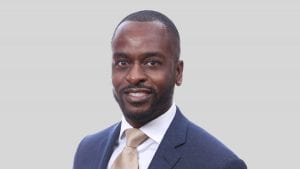
| Executive MBA students at Kellogg come from all industries (tech, healthcare, finance, consumer products, etc.), all organizational structures (family business, non-profit, public companies, etc.) and varied roles and levels (family business director, SVP of Cybersecurity, COO, etc.). For more than 40 years, we’ve believed that success for students at this stage of their careers comes from our ability to teach relevant, immediately transferable skills, and to facilitate learning from faculty and from their peers in the room. Our students are a high-impact, low-ego community who want an MBA experience where they can collaborate, get involved and learn from each other. We describe our students as working professionals who want to apply what they learn in the classroom in their work the very next day. We work with students to customize and tailor their experience to meet their goals and pre-existing commitment |
3) What types of financial aid are available to students?
| Kellogg recognizes that earning your MBA requires a significant financial commitment. We strongly encourage EMBA students to apply for financial aid. Additionally, the EMBA program offers several options for scholarships every year. Our financial aid expert recently wrote this blog post to provide insights into financing a Kellogg EMBA degree. |
Virginia Tech’s MBA program offers flexibility, because life happens
A graduate assistantship position can make an MBA more affordable, offer flexibility, and provide rich learning opportunities for those facing life’s changing circumstances.
Maryann Romero’s experience reflects the benefits of being a graduate assistant while in Virginia Tech’s MBA program. “Being a graduate assistant helped me solidify what I wanted to do with my degree,” she said. “It provided the opportunity to put my learnings to practice before applying them to the ‘real world.’ ”
Romero had reached a stage in her life and her career where she recognized that having an MBA would be an asset if she wanted to shift gears. “Not just to add to my resumé, but mainly to expand my management skills and understand business on a different level,” said Romero, who has an undergraduate degree in communications and rhetorical studies from Syracuse University.
Romero completed Virginia Tech’s Evening MBA program in two and a half years. “It opened the path to pursue my new career as a client insights analyst at Comscore within the financial services division.”
The program helped her achieve her goal of thinking more strategically and analytically when making business decisions, she said. “I also brushed up on my coaching skills along the way when dealing with organizational behavior.” In her new job, she said: “I use skills from statistics, marketing, strategic management and business intelligence courses on a daily basis.”
Noting the program’s flexibility, allowing students to move between full-time and part-time status, Romero said she started out as a part-time student taking two classes a week.
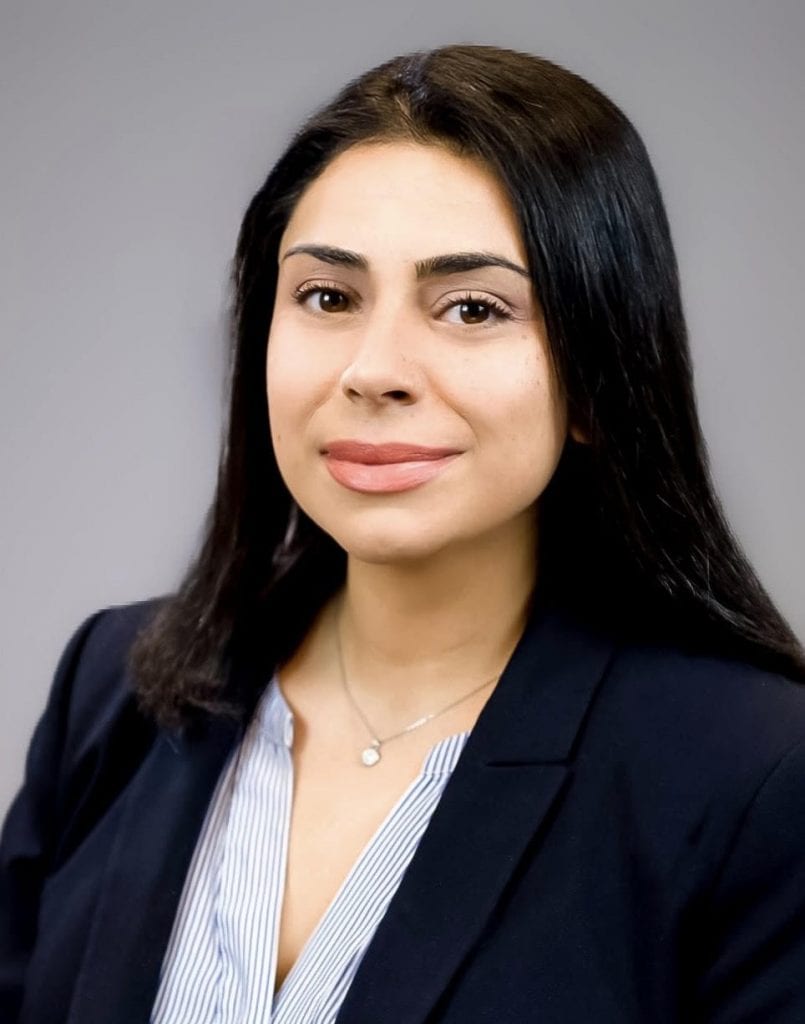
“I was a stay-at-home mom at the time and just had my second baby. Once I got into the groove of going back to school and understood the expectation of the workload, I was invited to apply to the graduate assistantship program as a full-time student.
“Becoming a graduate assistant was the perfect opportunity for me to get back into the swing of work routines along with a school load. In addition, the program assisted me financially, as I was not working at the time. Best of all, I completed my degree a whole year sooner than I expected!”
The position was also an enriched learning opportunity for Romero, who helped marketing professor Dipankar Chakravarti with behavioral experiments for his research. “I was introduced to survey design and distribution as well as analyzing data to tell a story with the results.”
Not least of all were the friendships she formed. Throughout the program, her classmates became her network and support system. “I learned to work with team members of different personalities and diverse career experiences. Many are still my good friends after graduation.”
“While most of our students are on a part-time schedule, Maryann enhanced her MBA experience by taking classes on a full-time basis while on a graduate assistantship,” said Dana Hansson, Virginia Tech MBA programs director. “Working directly with faculty, earning a stipend, and receiving tuition assistance make graduate assistantships a great opportunity for MBA students. It’s both an economical and enriching way to accelerate the completion of your degree.”
For more information about Virginia Tech’s three MBA program options, visit mba.vt.edu.
MBA (online/in-person)
Robert Morris MBA Program Structure
The Robert Morris MBA curriculum consists of 10 three-credit courses for a total of 30 credits to complete the program. MBA courses are taught in an 8-week accelerated format. Students taking one course every eight weeks can complete the degree requirements in less than two years. On-ground courses at Moon campus are taught one evening per week from 6 to 10 p.m. Fully online courses are taught by the same quality faculty who teach in the on-ground program.
Inspired by the real-world workplace, the new RMU MBA features team teaching in every class. Two expert faculty from different disciplines reinforce the interrelation of management, finance, marketing, and other key business skills. Available online or on-ground.
- Completely restructured
- Personalized and flexible
- Online and on-ground
- An MBA designed for professionals
- Specialized online certificates can be earned separately or as part of the MBA
- Team-taught integrated courses with a real-world focus
Curriculum
Earn a 12-credit online certificate — separately or MBA-integrated — and put yourself on track for advancement in these high-demand fields:
- Business Analytics
- Project Management
- Supply Chain and Logistics Management
Career Statistics
Top employers for Robert Morris MBA graduates include Alcoa, Bayer, BNY Mellon, Deloitte, Dick’s Sporting Goods, FedEx, KPMG, Pittsburgh Penguins, PNC Bank, PWC, PPG and the Pittsburgh Steelers.
Tuition, Scholarships, and Financial Aid
Tuition for the Robert Morris MBA is $975 per credit. The total tuition cost is roughly $29,250. Robert Morris provides financial aid opportunities such as the Colonial Success Fund,an innovative college financing tool called an income share agreement (ISA) to help make college more affordable for our students by reducing the amount of traditional student loan debt they need in order to fund their education.
Hybrid MBA: The Best of Both Worlds for Aspiring Business Leaders
A Master of Business Administration (MBA) degree remains one of the most sought-after credentials by individuals today. In fact, a recent Graduate Management Admission Council (GMAC) study reveals that 60% of prospective students prefer MBA programs over other types of master’s degrees. For professionals on the rise, an MBA is a key credential. But while an MBA may help launch the next stage of a career, few are willing to put everything on hold to obtain one. Staying on top of course work while holding down a job and meeting personal obligations is challenging at best. No wonder nearly 3 out of 4 U.S. full-time two-year MBA programs report a steady decline in applications received. The Virginia Tech Hybrid MBA offers the ability to meet the needs of aspiring applicants.
“Students nowadays aren’t willing to go to school to earn an MBA on a full-time basis and forego the economic benefits of a full-time job,” says Dr. Parviz Ghandforoush, Associate Dean for Graduate Programs at Virginia Tech’s Pamplin College of Business.
That’s one of the reasons why business schools like Pamplin have developed an alternative: hybrid MBA program options that combine the flexibility of online courses with the in-person interaction of a traditional MBA.
LESSONS FOR A CHANGING WORK ENVIRONMENT
Whether earned online or in-person, the advantages of an MBA have never been clearer. These days, an increasing number of organizations are embracing a collaborative work environment where employees must partner with leaders from varying business functions to achieve corporate goals. An MBA can help managers and leaders excel in this new and integrated work environment by imbuing them with sharper decision-making capabilities, a broader worldview, and better communication skills.
Consider, for example, the world of technology. It’s changing quickly—but so are the demands of the corporate enterprise. According to IDG research, today’s IT buying team contains an average of 21 stakeholders: 11 from IT and 10 from the business. The more an IT leader understands the needs and challenges of his business leaders, the better he will be prepared for smart technology investments with real bottom-line rewards.

THE TIME IS ALWAYS RIPE FOR A VIRGINIA TECH HYBRID MBA EDUCATION
A hybrid MBA caters to all business functions and all ages. Many middle managers who are looking to advance their careers are in their 30s—the age at which many people are having children, carrying a home mortgage, or paying down student debt—hardly an opportune time to enroll in a full-time, lecture-based MBA program. Even more experienced and career-established individuals in their 40s and 50s must contend with demanding work schedules and time constraints.
Virginia Tech recognized this market reality and designed two programs that combine the best of both worlds: Professional MBA and Executive MBA. Online collaboration and discussion modules give students flexibility to access coursework whenever and wherever they are located. In-person class lectures offer hands-on learning, face-to-face discussions, and substantive interaction with instructors and classmates.
According to Dana Hansson, Director of MBA Programs at Virginia Tech, the hybrid nature of the programs deliver flexibility and “a personal touch” that encourages students from various industries, work settings, and management layers to pool their experiential knowledge.
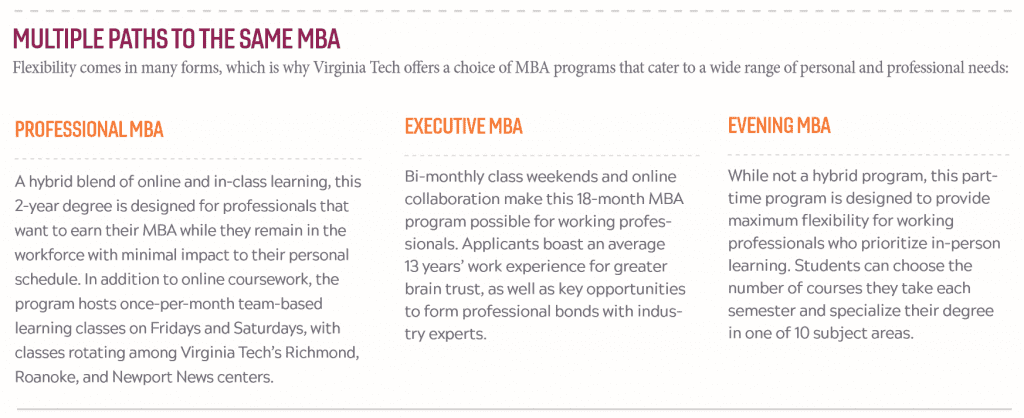
HOW TO CAPITALIZE ON A HYBRID EDUCATION
Both Pamplin Hybrid MBA pathways to a degree– Professional and Executive – offer advantages that promise to resonate long after a program’s completion.
- A ROBUST CAREER NETWORK: An in-person element and cohort format create lasting relationships that can deliver significantly more value and meaning than any LinkedIn connection. Membership in an elite institution also promotes close professional relationships among peers throughout Virginia and the greater Washington, D.C., metro area.
- ACCESS TO A VAST ALUMNI NETWORK: With more than 100,000 alumni in the mid-Atlantic region alone, an MBA degree from Virginia Tech provides students with access to industry professionals and mentors, many of whom can connect graduates with opportunities for career advancement.
- SAVINGS: A part-time format means applicants can maintain a steady income while also furthering their career aspirations. As a public university, Virginia Tech also offers a high-value tuition rate.
- SPEED AND CONVENIENCE: The part-time Professional MBA and Executive MBA programs each can be completed in the same amount of time as a traditional full-time program, and less than a traditional part-time program.
AN EDUCATIONAL ADVANTAGE
MBA graduates are in high demand as organizations look to boost their talent troves with diverse skillsets, strong leadership, and curious minds. But fulfilling these market demands shouldn’t have to come at the expense of managing a full-time job, family, and other important priorities. By enrolling in the Virginia Tech Hybrid MBA or Executive MBA, aspiring careerists and seasoned professionals alike can build their business knowledge at a pace and style that suits their present needs.

